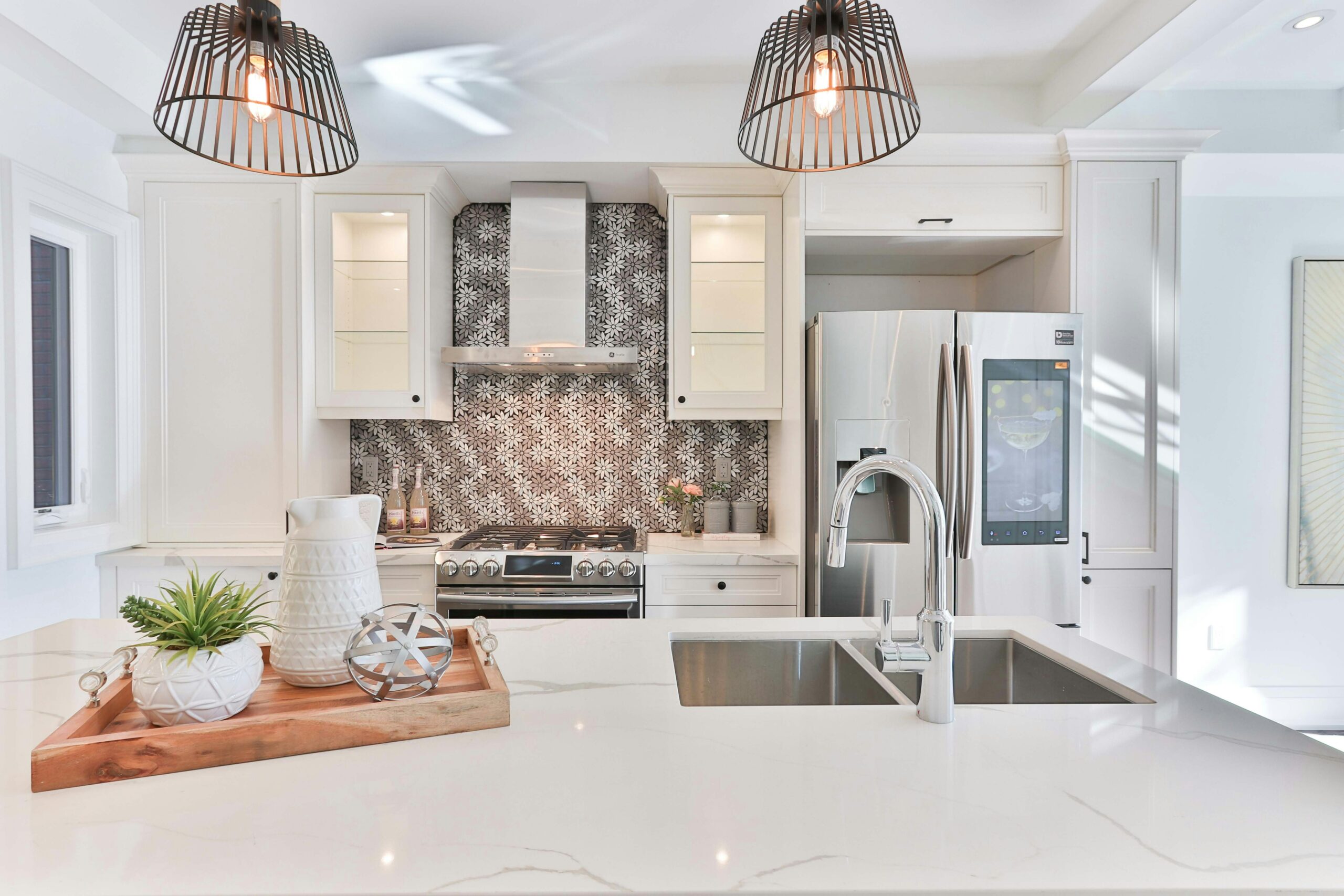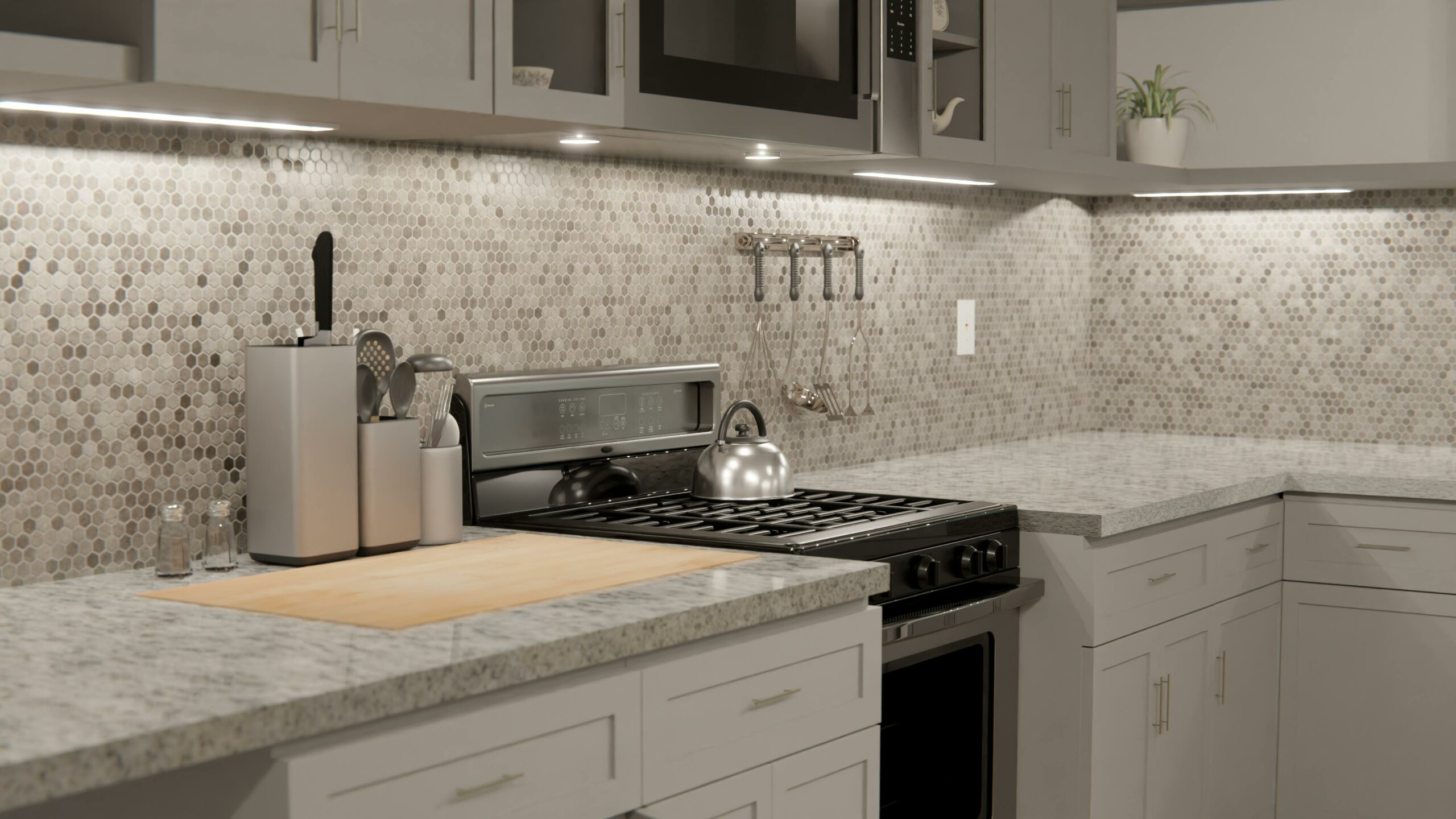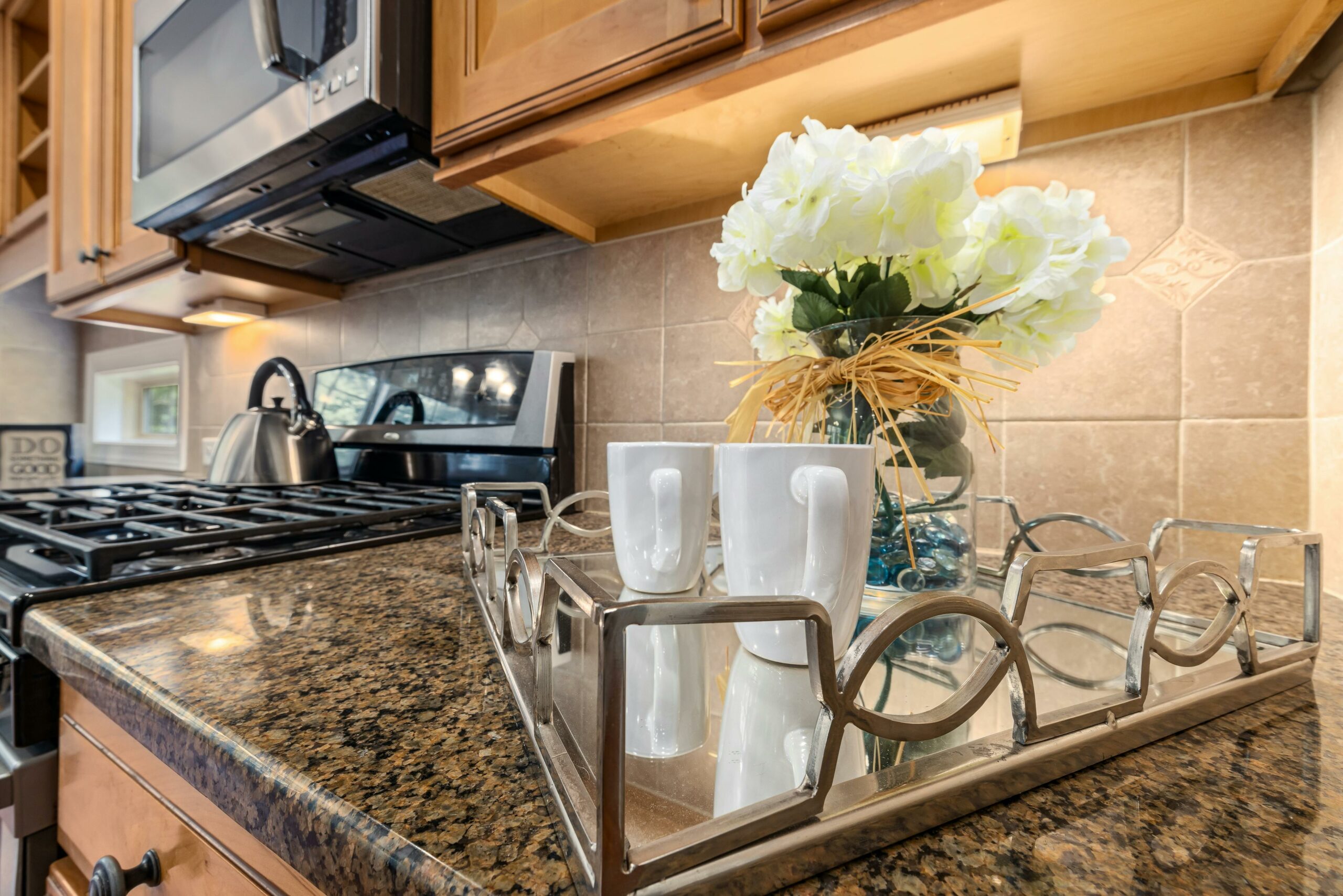When it comes to enhancing the overall functionality and aesthetics of your kitchen space, selecting the appropriate Countertop for Kitchen is indispensable. The right kitchen countertop not only forms the focal point of your kitchen but is also the site where most of your food preparations take place. The countertop’s material, design, and size can significantly impact the style, efficiency, and convenience of your kitchen activities.
From understanding the key features, evaluating the pros and cons of various materials, to maintenance and cleaning tips, this guide will delve deeply into all the crucial aspects you need to consider when choosing a Countertop for Kitchen. Furthermore, we will provide insights on measuring, installing, and exploring sustainable countertop options for your kitchen space.
With so many options available, choosing the perfect kitchen countertop can seem overwhelming. Armed with the right knowledge, measuring tools, and your personal design preferences, you can make an informed decision and choose a countertop that will serve you well for years to come.
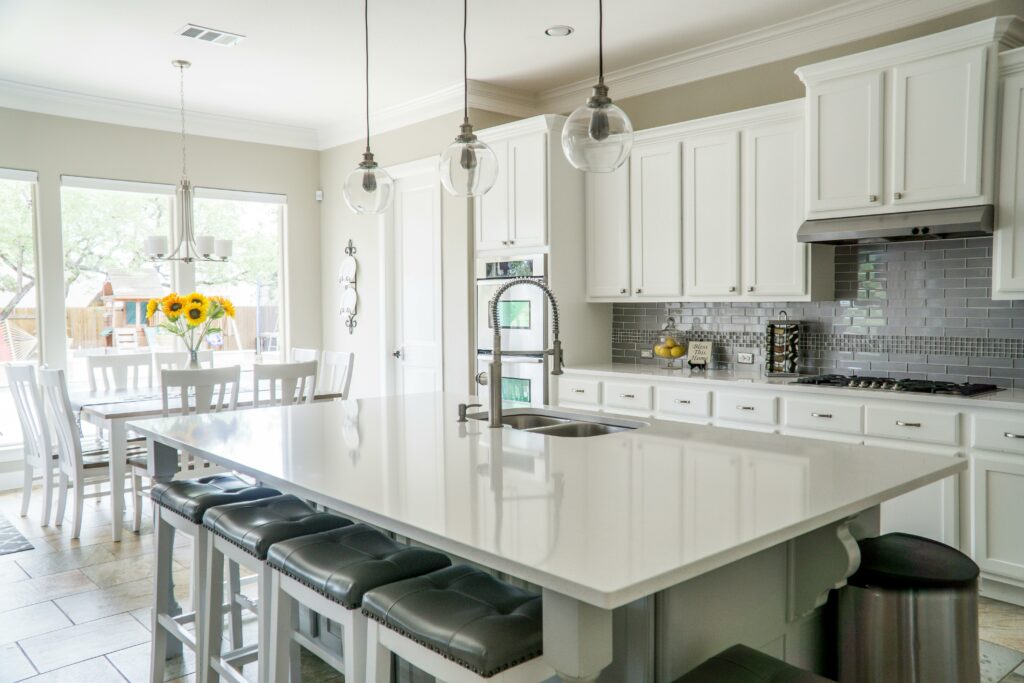
Understanding the Importance of a Kitchen Countertop
A kitchen countertop is one of the most essential components of any kitchen. It serves as a workspace, a storage area, and a focal point for the overall design of the kitchen. Understanding the importance of a kitchen countertop can help you make informed decisions when choosing the right one for your kitchen remodel.
First and foremost, a kitchen countertop provides a functional workspace for meal preparation, cooking, and other kitchen tasks. It should be durable, heat-resistant, and easy to clean. A high-quality countertop can withstand the daily wear and tear of a busy kitchen and last for years to come.
In addition to its functionality, a kitchen countertop also plays a significant role in the overall design aesthetic of your kitchen. It can enhance the visual appeal and add a touch of elegance to the space. Choosing the right countertop material, color, and texture can transform the look and feel of your kitchen.
Another important aspect to consider when selecting a kitchen countertop is its ability to increase the value of your home. A well-designed and well-maintained countertop can significantly enhance the resale value of your property. It is an investment that not only improves the functionality and aesthetics of your kitchen but also adds value to your home.
Furthermore, a kitchen countertop serves as a gathering place for family and friends. It is often the center of social activities, such as cooking together, enjoying meals, or simply having conversations. Therefore, it is crucial to choose a countertop that is not only functional and visually appealing but also creates a welcoming and inviting atmosphere in your kitchen.
In conclusion, understanding the importance of a kitchen countertop is essential when planning a kitchen remodel. It is a multi-functional element that serves as a workspace, a design statement, and a gathering place. By carefully considering the functionality, aesthetics, and value it brings to your home, you can choose the perfect countertop that meets your needs and enhances your overall kitchen experience.
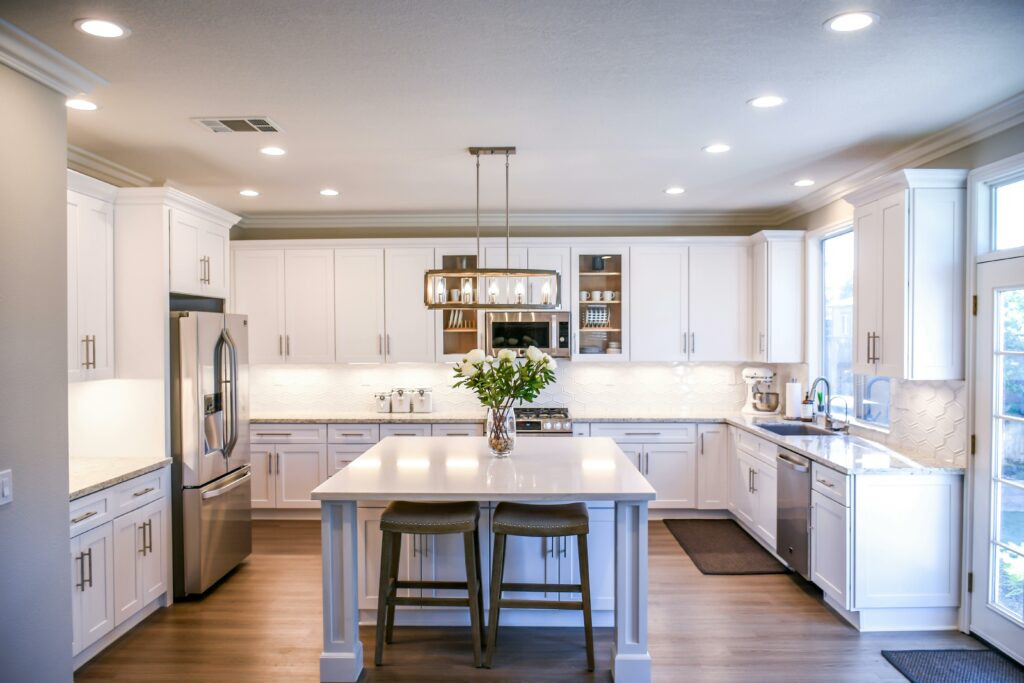
Features to Look For When Choosing a Countertop for Kitchen
When choosing a countertop for your kitchen, there are several important features to consider. These features will not only affect the aesthetics of your kitchen but also the functionality and durability of your countertop. Here are some key features to look for:
1. Material
The material of the countertop is one of the most important factors to consider. There are various materials available, each with its own pros and cons. Some popular options include granite, quartz, marble, and laminate. Consider factors such as durability, maintenance requirements, and appearance when choosing the material for your countertop.
2. Durability
A kitchen countertop is subjected to daily wear and tear, so it’s essential to choose a durable material. Look for a countertop that can withstand heat, scratches, stains, and impact. Materials like granite and quartz are known for their durability and resistance to damage.
3. Maintenance
The level of maintenance required for your countertop should also be taken into account. Some materials, like granite, require regular sealing to maintain their appearance and prevent stains. On the other hand, materials like quartz and laminate are relatively low maintenance and easy to clean.
4. Appearance
The appearance of your countertop can greatly impact the overall look of your kitchen. Consider the color, pattern, and texture of the material. Some materials, like granite and marble, offer a natural and unique look, while others, like quartz, can mimic the appearance of natural stone.
5. Cost
Budget is always a factor when choosing a countertop. Different materials come at different price points, so consider your budget and choose a material that fits within it. Remember to also consider the long-term costs of maintenance and repairs.
6. Functionality
Think about how you will be using your countertop. Do you need a surface that is heat-resistant for placing hot pots and pans? Do you require a non-porous surface for easy cleaning and hygiene? Consider your specific needs and choose a countertop that offers the right functionality for your kitchen.
By considering these features when choosing a countertop for your kitchen, you can ensure that you make an informed decision that meets your needs and preferences. Remember to also consult with professionals and gather samples to see how different materials will look in your kitchen.

Different Materials Used in Kitchen Countertops
When it comes to choosing a kitchen countertop, there are a wide variety of materials to choose from. Each material has its own unique characteristics and benefits, so it’s important to understand the different options available. Here are some of the most popular materials used in kitchen countertops:
1. Granite
Granite is a natural stone that is known for its durability and beauty. It is heat-resistant, scratch-resistant, and can withstand heavy use. Granite countertops come in a wide range of colors and patterns, making it a versatile choice for any kitchen.
2. Quartz
Quartz countertops are engineered stone countertops that are made from a combination of natural quartz and resin. They are non-porous, stain-resistant, and easy to maintain. Quartz countertops come in a wide variety of colors and patterns, making it easy to find the perfect match for your kitchen.
3. Marble
Marble countertops are known for their elegance and timeless beauty. They are heat-resistant, but they can be prone to staining and scratching. Marble countertops require regular sealing and maintenance to keep them looking their best.
4. Solid Surface
Solid surface countertops are made from a combination of acrylic and polyester materials. They are non-porous, stain-resistant, and easy to clean. Solid surface countertops come in a wide variety of colors and patterns, and they can be seamlessly integrated with sinks and backsplashes.
5. Laminate
Laminate countertops are made from layers of paper and resin that are bonded together. They are affordable, easy to clean, and come in a wide variety of colors and patterns. However, laminate countertops can be prone to scratching and heat damage.
6. Stainless Steel
Stainless steel countertops are known for their sleek and modern look. They are heat-resistant, stain-resistant, and easy to clean. Stainless steel countertops are a popular choice for professional kitchens, but they can show scratches and fingerprints easily.
7. Concrete
Concrete countertops offer a unique and customizable option for kitchen countertops. They can be stained, stamped, or polished to achieve different looks. Concrete countertops are durable, heat-resistant, and can be sealed to prevent staining.
8. Butcher Block
Butcher block countertops are made from thick, solid wood. They provide a warm and natural look to any kitchen. Butcher block countertops require regular sealing and maintenance to prevent staining and water damage.
These are just a few of the different materials used in kitchen countertops. Each material has its own pros and cons, so it’s important to consider your needs and preferences when choosing the right countertop for your kitchen remodel.
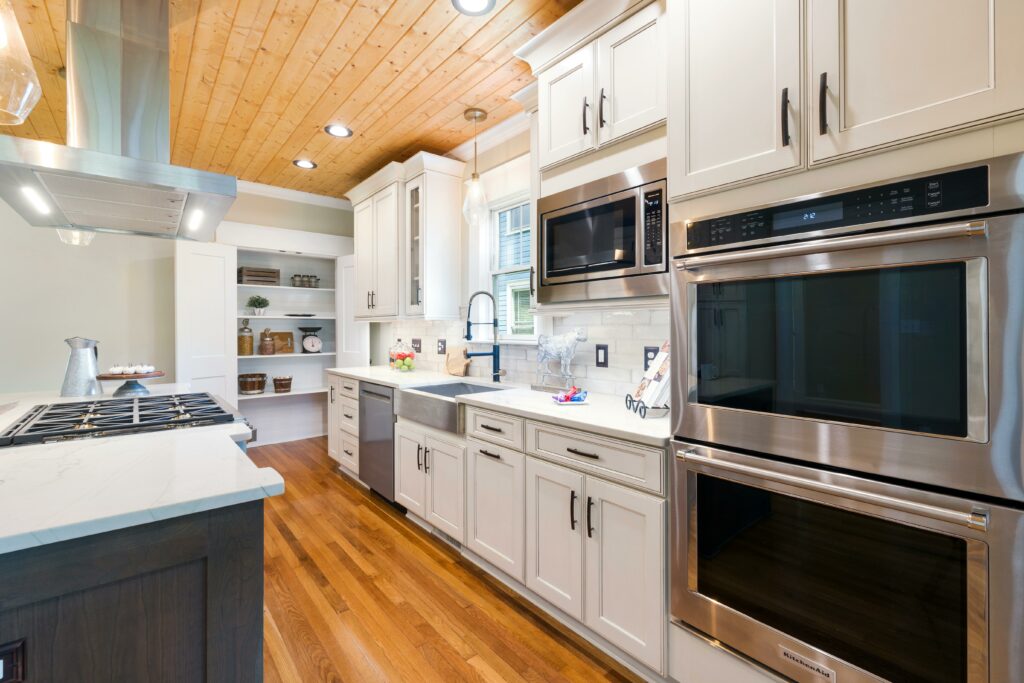
Maintaining and Cleaning Your Kitchen Countertop
Keeping your kitchen countertop clean and well-maintained is essential for both its longevity and hygiene. Here are some tips and guidelines to help you maintain and clean your kitchen countertop:
1. Regular Cleaning
Make it a habit to clean your countertop regularly to prevent the buildup of dirt, stains, and bacteria. Use a mild detergent or a mixture of warm water and vinegar to wipe down the surface. Avoid using abrasive cleaners or scrub brushes that can damage the countertop material.
2. Avoid Harsh Chemicals
Avoid using harsh chemicals, such as bleach or ammonia-based cleaners, on your countertop. These chemicals can cause discoloration and damage to the surface. Instead, opt for gentle cleaners that are specifically formulated for your countertop material.
3. Use Cutting Boards and Trivets
Protect your countertop from scratches and heat damage by using cutting boards and trivets. Avoid placing hot pots and pans directly on the countertop surface, as it can cause burns or discoloration. Use cutting boards when chopping or slicing food to prevent knife marks on the countertop.
4. Clean Spills Immediately
Accidents happen, and spills are inevitable in the kitchen. However, it’s important to clean up spills immediately to prevent staining and potential damage to the countertop. Use a clean cloth or paper towel to blot the spill and then clean the area with a mild detergent.
5. Seal Your Countertop
If your countertop is made of a porous material, such as granite or marble, it’s important to seal it regularly. Sealing helps protect the surface from stains and makes it easier to clean. Follow the manufacturer’s instructions on how often to seal your countertop.
6. Avoid Heavy Impact
Avoid dropping heavy objects or applying excessive force on your countertop, as it can cause cracks or chips. Be cautious when handling heavy pots and pans to prevent any damage to the surface. Use cutting boards or trivets to provide a cushioned surface for heavy items.
7. Preventive Maintenance
Perform regular preventive maintenance on your countertop to keep it in optimal condition. This may include resealing, polishing, or repairing any minor damages. Consult the manufacturer’s guidelines or seek professional advice for specific maintenance requirements for your countertop material.
By following these guidelines, you can keep your kitchen countertop looking clean, beautiful, and functional for years to come.
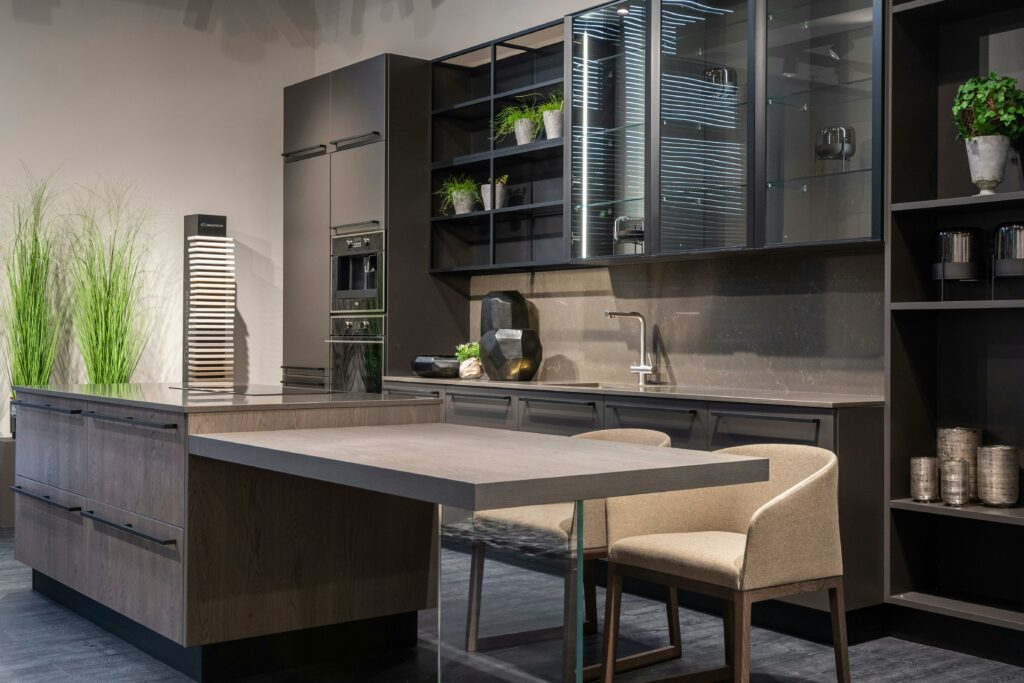
Elegant Countertop Design Ideas for Your Kitchen
When it comes to designing your kitchen, the countertop plays a crucial role in both functionality and aesthetics. A well-designed countertop can enhance the overall look and feel of your kitchen, making it a focal point of the space. Here are some elegant countertop design ideas to inspire your kitchen remodel:
1. Marble Elegance
Marble countertops exude elegance and sophistication. The natural veining and unique patterns of marble add a luxurious touch to any kitchen. Whether you choose a classic white marble or opt for a more dramatic black marble, this timeless material will elevate the design of your kitchen.
2. Sleek Quartz
Quartz countertops offer a sleek and modern look that complements a variety of kitchen styles. With its durability and low maintenance, quartz is a popular choice among homeowners. Available in a wide range of colors and patterns, you can find the perfect quartz countertop to match your kitchen design.
3. Bold Granite
Granite countertops are known for their durability and natural beauty. With its wide range of colors and patterns, granite can add a bold and unique statement to your kitchen. Whether you prefer a subtle speckled pattern or a striking swirl, granite countertops are sure to make a lasting impression.
4. Timeless Butcher Block
For a warm and inviting look, consider installing a butcher block countertop. Made from natural wood, butcher block countertops bring a rustic charm to your kitchen. They are also highly functional, providing a durable surface for food preparation.
5. Industrial Concrete
If you’re looking for a modern and industrial aesthetic, concrete countertops are a great choice. With their sleek and minimalist design, concrete countertops can add a contemporary touch to your kitchen. They are also highly customizable, allowing you to choose the color and texture that best suits your style.
6. Unique Tile
Tile countertops offer endless design possibilities. From colorful mosaic patterns to classic subway tiles, you can create a unique and personalized look for your kitchen. Tile countertops are also easy to clean and maintain, making them a practical choice for busy kitchens.
When selecting a countertop design for your kitchen, consider the overall style and color scheme of the space. Choose a material and design that complements your cabinets, backsplash, and flooring to create a cohesive and elegant look. With the right countertop design, your kitchen will become a beautiful and functional space for cooking and entertaining.
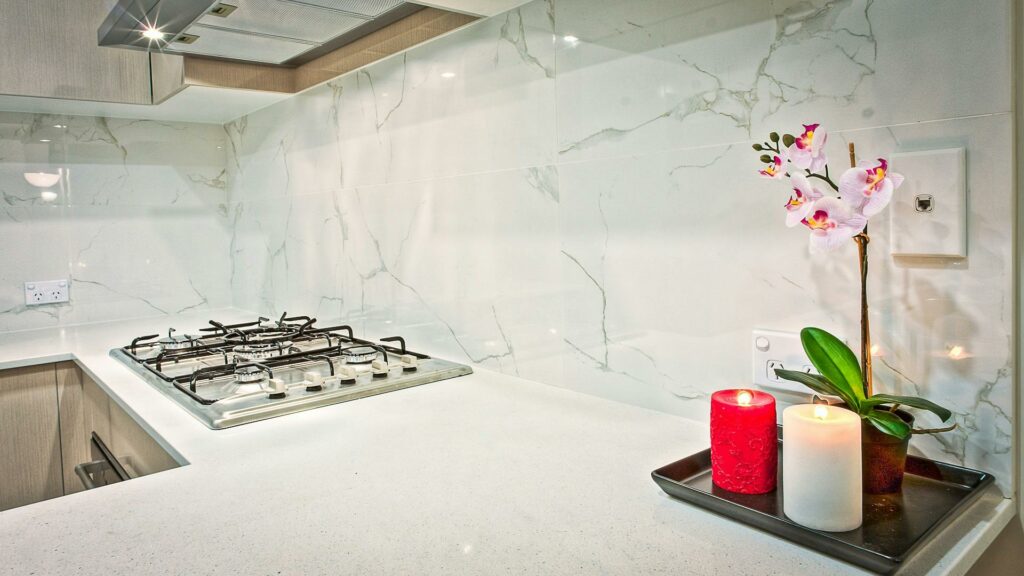
How to Measure Your Kitchen for a New Countertop
When it comes to installing a new countertop in your kitchen, accurate measurements are crucial. By measuring your kitchen properly, you can ensure that you choose the right size and shape of countertop that fits perfectly in your space. Here are some steps to help you measure your kitchen for a new countertop:
1. Prepare your tools
Before you start measuring, gather the necessary tools such as a tape measure, pencil, paper, and a calculator. These tools will help you accurately measure your kitchen and calculate the dimensions of your new countertop.
2. Measure the length and width of your existing countertop
Start by measuring the length and width of your existing countertop. Use the tape measure to measure from one end of the countertop to the other, and write down the measurements. Repeat this step for the width of the countertop.
3. Measure the depth of your existing countertop
Next, measure the depth of your existing countertop. This measurement is important as it will determine how much overhang you can have on your new countertop. Measure from the back of the countertop to the front edge and write down the measurement.
4. Measure the dimensions of your kitchen cabinets
Measure the dimensions of your kitchen cabinets to determine the size of the countertop you will need. Measure the length and width of each cabinet and write down the measurements. Take into account any appliances or fixtures that will be installed on the countertop, such as a sink or cooktop.
5. Consider the desired overhang
Decide on the desired overhang for your new countertop. The overhang refers to the amount of countertop that extends beyond the edge of the cabinets. A standard overhang is typically around 1-1.5 inches, but you can choose a larger overhang if desired. Take this into account when calculating the dimensions of your new countertop.
6. Calculate the dimensions of your new countertop
Using the measurements you have taken, calculate the dimensions of your new countertop. Add the length of the existing countertop to the length of the cabinets, taking into account the desired overhang. Repeat this step for the width of the countertop. Write down the final dimensions.
7. Double-check your measurements
Before finalizing your measurements, double-check all the dimensions you have calculated. Make sure they are accurate and that you have taken into account any appliances or fixtures that will be installed on the countertop.
By following these steps and taking accurate measurements, you can ensure that your new countertop will fit perfectly in your kitchen. Remember to always double-check your measurements and consult with a professional if needed. Happy measuring!
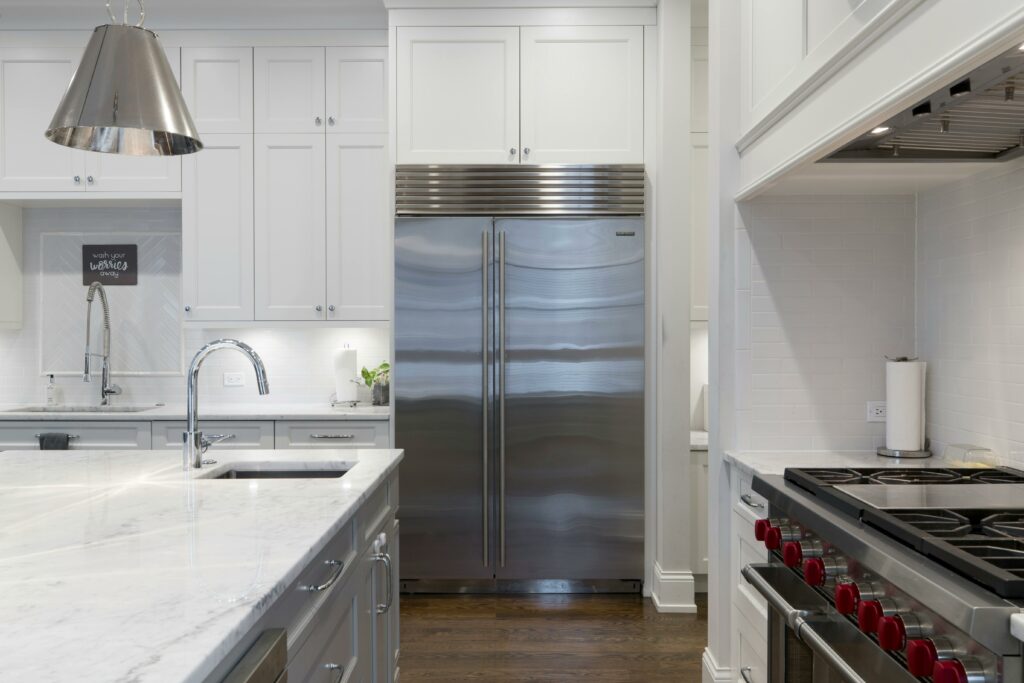
Choosing the Right Countertop for Your Kitchen Remodel
When it comes to remodeling your kitchen, one of the most important decisions you’ll have to make is choosing the right countertop. The countertop not only serves as a functional surface for preparing meals but also plays a significant role in the overall aesthetic of your kitchen. With so many options available, it can be overwhelming to decide which countertop material is best for your needs. Here are some factors to consider when making your decision:
1. Durability
One of the key features to look for in a kitchen countertop is durability. Since the countertop is subjected to daily wear and tear, it’s important to choose a material that can withstand the demands of a busy kitchen. Materials like granite, quartz, and stainless steel are known for their durability and resistance to scratches, stains, and heat.
2. Maintenance
Another important factor to consider is the maintenance required for the countertop material. Some materials, like marble, require regular sealing and special care to prevent staining. On the other hand, materials like quartz and laminate are low-maintenance and easy to clean. Consider your lifestyle and how much time and effort you’re willing to invest in maintaining your countertop.
3. Style and Design
The countertop is a prominent feature in your kitchen, so it’s essential to choose a material that complements your overall design aesthetic. Whether you prefer a sleek and modern look or a more traditional and rustic style, there are countertop materials available to suit every taste. Consider the color, texture, and pattern options offered by different materials to find the perfect fit for your kitchen.
4. Budget
Your budget is another crucial factor to consider when choosing a countertop for your kitchen remodel. Countertop materials vary greatly in price, with natural stones like granite and marble being more expensive than laminate or tile. Set a budget for your countertop and explore different materials within that range to find the best balance between cost and quality.
5. Functionality
Lastly, consider how you use your kitchen and what functionalities you need from your countertop. If you love to cook and frequently use knives, a material like butcher block may be a good option. If you have young children and want a surface that is easy to clean and resistant to stains, consider materials like quartz or solid surface. Think about your specific needs and choose a countertop material that can accommodate them.
By considering these factors, you can make an informed decision and choose the right countertop for your kitchen remodel. Remember to take your time, do your research, and consult with professionals if needed. A well-chosen countertop will not only enhance the functionality of your kitchen but also add beauty and value to your home.
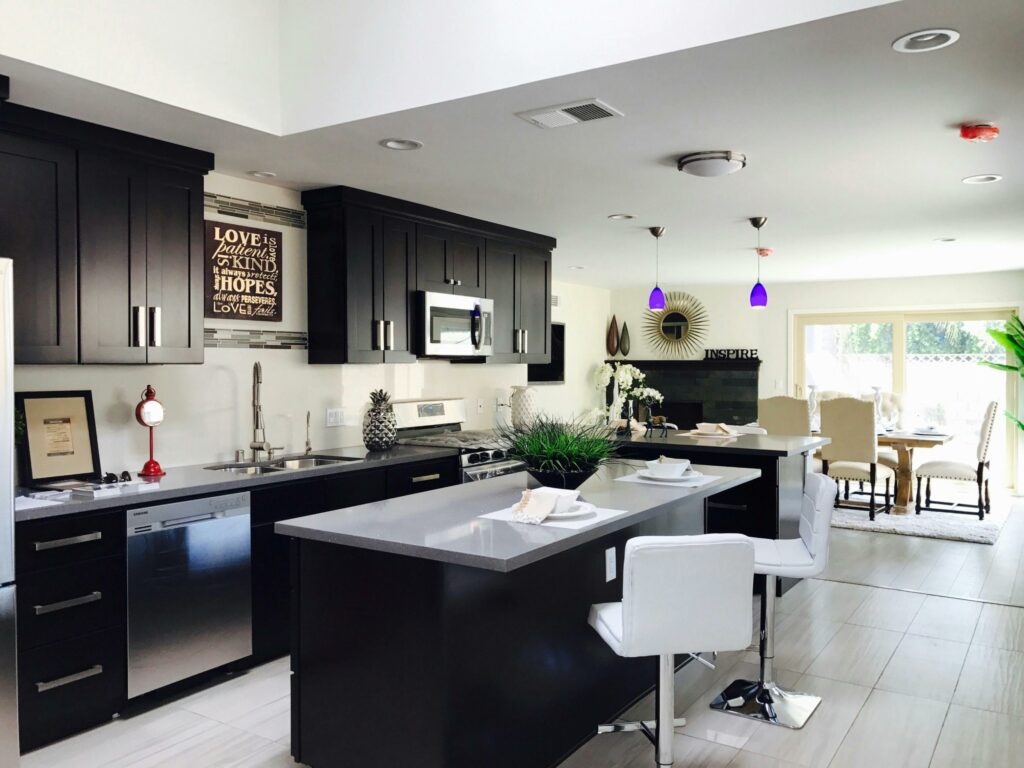
Pros and Cons of Popular Kitchen Countertop Materials
When it comes to choosing a kitchen countertop material, there are plenty of options available. Each material has its own set of pros and cons that you should consider before making a decision. Here are some popular kitchen countertop materials and their advantages and disadvantages:
1. Granite
Pros:
-
- Durable and long-lasting
-
- Natural beauty with unique patterns and colors
-
- Heat and scratch resistant
Cons:
-
- Expensive compared to other materials
-
- Requires regular sealing to prevent stains
-
- Can crack or chip if not properly cared for
2. Quartz
Pros:
-
- Non-porous and resistant to stains
-
- Wide range of colors and patterns
-
- Low maintenance and easy to clean
Cons:
-
- Can be more expensive than other materials
-
- Not as heat resistant as granite
-
- May discolor over time with exposure to sunlight
3. Marble
Pros:
-
- Elegant and timeless appearance
-
- Natural cooling properties
-
- Available in a variety of colors and veining patterns
Cons:
-
- Prone to scratching and staining
-
- Requires regular sealing and maintenance
-
- Not as durable as granite or quartz
4. Laminate
Pros:
-
- Affordable and budget-friendly
-
- Easy to clean and maintain
-
- Wide range of colors and patterns
Cons:
-
- Not as durable as natural stone materials
-
- Can be easily damaged by heat and sharp objects
-
- May show signs of wear and tear over time
5. Stainless Steel
Pros:
-
- Modern and sleek appearance
-
- Resistant to heat, stains, and bacteria
-
- Easy to clean and maintain
Cons:
-
- Can be noisy and prone to scratching
-
- May show fingerprints and smudges easily
-
- Can be expensive compared to other materials
When choosing a kitchen countertop material, it’s important to consider your budget, lifestyle, and personal preferences. Each material has its own unique characteristics, so make sure to weigh the pros and cons before making your final decision.
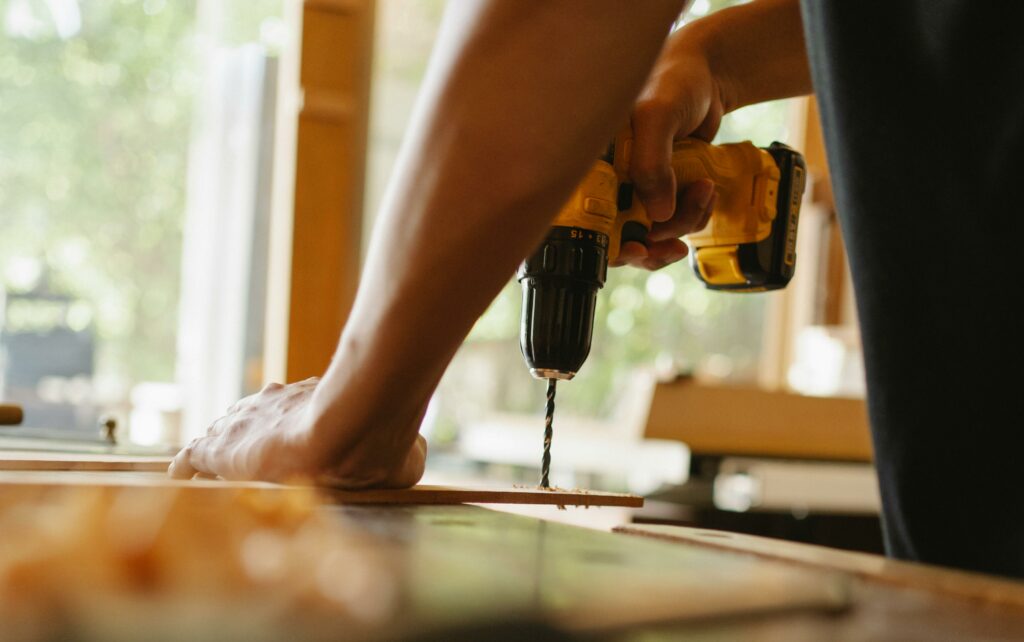
How to Install a Countertop for Kitchen
Installing a countertop for your kitchen can be a challenging task, but with the right tools and knowledge, you can do it yourself. Follow these steps to ensure a successful installation:
1. Prepare the workspace
Before you begin installing the countertop, make sure your workspace is clean and free of any debris. Remove the old countertop if necessary and ensure that the cabinets are level and sturdy.
2. Measure and cut the countertop
Take accurate measurements of your kitchen cabinets to determine the size of the countertop you need. Use a circular saw or a jigsaw to cut the countertop to the desired dimensions. Make sure to wear safety goggles and gloves while cutting.
3. Install the countertop supports
Place countertop supports or brackets on top of the cabinets to provide additional support for the countertop. Make sure they are evenly spaced and securely attached to the cabinets.
4. Apply adhesive
Apply a bead of construction adhesive along the top edges of the cabinets. This will help secure the countertop in place and prevent it from shifting.
5. Set the countertop in place
Carefully lift the countertop and place it on top of the cabinets. Make sure it is aligned properly and fits snugly against the wall. Press down firmly to ensure a strong bond with the adhesive.
6. Secure the countertop
Using screws or brackets, secure the countertop to the supports or brackets installed in step 3. Make sure to drive the screws in evenly and securely to prevent any movement or wobbling.
7. Seal the edges
Apply a silicone caulk along the edges of the countertop to create a watertight seal. Smooth out the caulk with a caulk smoothing tool or your finger for a professional finish.
8. Test and clean
After the installation is complete, test the countertop to ensure it is securely in place. Clean any excess adhesive or caulk from the surface of the countertop using a damp cloth or sponge.
By following these steps, you can successfully install a countertop for your kitchen and enjoy a beautiful and functional workspace.
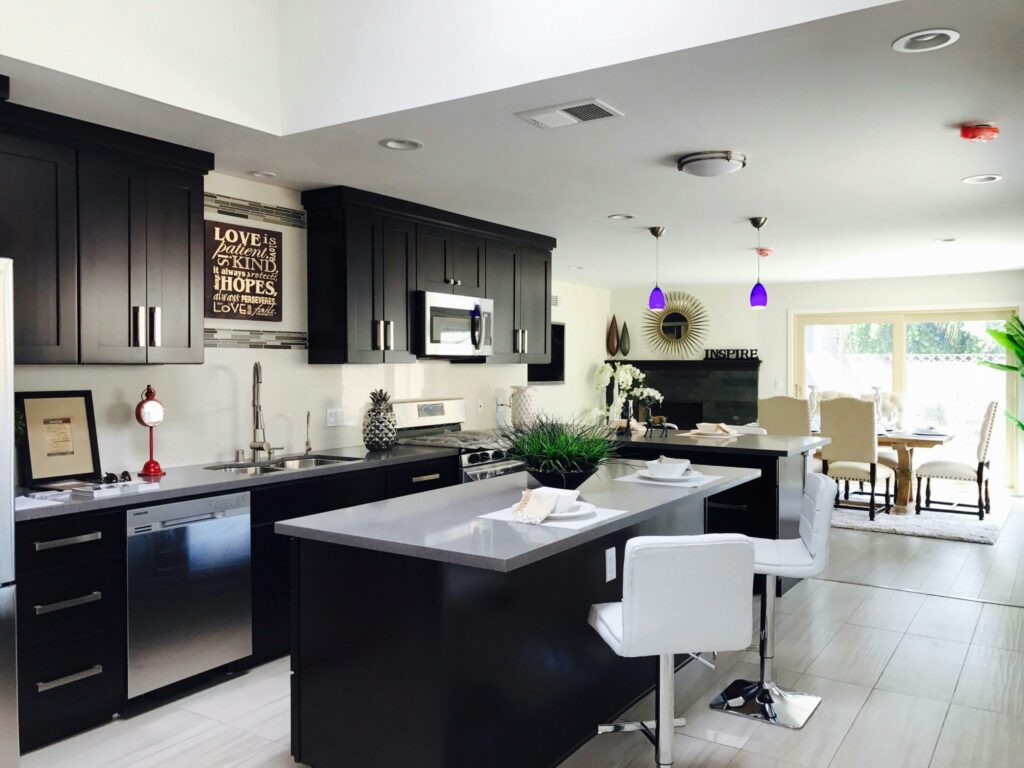
Countertop Options for Sustainable Kitchens
When it comes to designing a sustainable kitchen, choosing the right countertop is essential. Not only does the countertop play a functional role in the kitchen, but it also has a significant impact on the overall sustainability of the space. Here are some countertop options that are both eco-friendly and stylish:
1. Recycled Glass Countertops
Recycled glass countertops are a popular choice for sustainable kitchens. These countertops are made from crushed glass that is mixed with a binder and then formed into slabs. They come in a wide range of colors and patterns, making them a versatile option for any kitchen design.
2. Bamboo Countertops
Bamboo is a fast-growing and renewable resource, making it an excellent choice for eco-friendly countertops. Bamboo countertops are durable, water-resistant, and have a unique natural grain pattern that adds a touch of warmth to the kitchen.
3. Butcher Block Countertops
Butcher block countertops are made from thick strips of wood that are glued together to create a solid surface. They are a sustainable option as they are made from renewable wood sources. Butcher block countertops add a warm and rustic look to the kitchen and are perfect for food preparation areas.
4. Concrete Countertops
Concrete countertops are not only durable but also environmentally friendly. They can be made with recycled materials such as fly ash or recycled glass aggregates. Concrete countertops offer a modern and industrial look to the kitchen and can be customized with different colors and finishes.
5. Stainless Steel Countertops
Stainless steel countertops are a popular choice for commercial kitchens due to their durability and hygienic properties. They are also a sustainable option as stainless steel is recyclable. These countertops are sleek, modern, and easy to clean, making them a practical choice for any kitchen.
6. Paper Composite Countertops
Paper composite countertops are made from a mixture of paper fibers and resin. The paper used in these countertops is often recycled or sourced from sustainable forests. These countertops are heat-resistant, durable, and have a unique textured appearance.
By choosing one of these sustainable countertop options, you can create a kitchen that not only looks beautiful but also contributes to a greener and more eco-friendly lifestyle.

